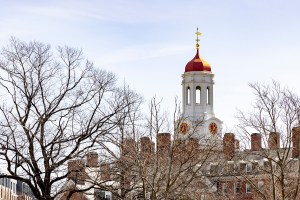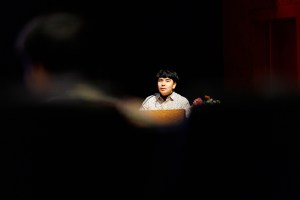
(Boston, MA – March 29, 2010) – William F. Lee, the newest member of the Harvard Corporation, participates in a Q&A with the Harvard Gazette from his law office in Boston. Staff Photo Stephanie Mitchell/Harvard University News Office
Stephanie Mitchell/Harvard Staff Photographer
Seeing Harvard from all sides
Newest Harvard Corporation member shares his perspective on the University
Bill Lee has seen Harvard from many vantage points: He attended the College, has taught at the Law School, served as an Overseer and has been a proud Harvard parent – twice. As he prepared to join the Corporation, Lee, co-managing partner of the law firm WilmerHale, sat down with the Gazette to share his perspective on an institution that has been part of his life for four decades.
Gazette: Do you have a memory that crystallizes your experience as a Harvard undergrad?
Lee: I do. I came from a small public high school. My parents were immigrants from China. My dad had a Ph.D. in physics, but he was nevertheless an immigrant from China. And I was the first person from my high school ever to get in and come to Harvard. I arrived and I thought, I have to be a mistake. There are all these smart, talented people. I’m just not quite sure what I’m doing here. Years later, when I was elected to the Board of Overseers and I arrived at my first meeting, I looked around the room at this phenomenally talented group of people and thought, oh my God, it’s happening again! What am I doing here?
There’s another story, too. The day that my dad dropped me off at Harvard, he helped me move my belongings into Pennypacker and then we took a walk down Mass Ave. He said to me, “so you’re going to be scientist.” And I said, “I am. I’m going to be an engineer, just like you.” We walked two or three more steps, and he said, “Well, if you’re going to be a scientist, you need to be a deep thinker.” I said, “Yeah.” We walked two or three more steps, and we stopped right across from the Hong Kong restaurant. My father looked me right in the eyes and said, “Well, you’re not. Change your major, do something different. It will work out.” And then he got in his car and he left! I changed my major.
Both of my brothers are professors at the Medical School. Both of them are younger, and both of them majored in science. They obviously didn’t get the same talk!
Gazette: How did you see the University when you returned as a visiting professor at the Law School?
Lee: I had a very different perspective. I didn’t go to Harvard Law School, so being able to teach at Harvard Law School was just a wonderful opportunity, and an intimidating opportunity. The faculty was very welcoming, and the kids were just so smart. They were just so smart. The course that we just finished teaching was an extraordinary experience. It was designed to address the question: What is a law school education missing? And Dean Kagan and Dean Minow decided that law school was missing the type of education that taught you judgment, leadership, relationship building, and teamwork, and we designed a course based upon business school-type case studies that are focused on legal issues. I actually helped design one about two and a half years ago. It was great for several reasons: We were doing something that was wholly different for law schools, a wholly different type of education. The class I taught had to do everything in teams of 16 students. They did reports in teams, they had to write in teams, they had to do their analysis in teams. It’s very common across the river, but not very common up at the Law School. It was also great because, in a very nontraditional way, the seven of us who were teaching the case to different groups met every day and talked about what worked, what didn’t work, what we would try, what we didn’t try. It’s just a great experience.
Gazette: How did your Harvard experiences inform your work on the Board of Overseers?
Lee: By the time I joined the Board of Overseers, I had been educated about Harvard in a couple different ways. I had been at the College for four years, and what I learned with the passage of time is that the most extraordinary part of the Harvard experience is your contemporaries. Two or three decades after you graduate, when you examine your relationship with your contemporaries, it is really more than you could have imagined at the age of 18 or 19. I’ll give you an example: Our firm is a merged firm between Wilmer Cutler & Pickering [based in Washington] and Hale and Dorr [based in Boston]. Part of the reason that merger was successful is that my college classmate, [former Deputy Attorney General and former Harvard Overseer] Jamie Gorelick, and [former Solicitor General and current Harvard Overseer] Seth Waxman, who was a year behind me, were at Wilmer. So when we decided to explore the possibility of a merger, I was sitting down talking to people I’d known since I was 18 or 19. That crystallized one of the great advantages Harvard has, which is it just attracts the most innovative, creative, dynamic people.
I also had the benefit of being around Boston, and being part of a law firm that has a large number of Harvard people. I had the experience of teaching. And then I had the best experience – I had been a parent. That just allowed me to see things from a whole variety of different perspectives – student, parent of student, faculty member, basically the consumer of what Harvard produces, the beneficiary of everything that Harvard can deliver.
Gazette: The University is emerging from a particularly challenging stretch. From your point of view, how have President Faust and the University handled this period, and how do you think things are lining up for the future?
Lee: I was on the search committee that selected President Faust. From the time I first met her in that process, I’ve been extraordinarily impressed with the type of leadership she brings, her personality, her vision, and her ability to get things done. She came into office during a time of some turmoil in the community. She did a pretty unbelievable job of taking her very calm, very thorough manner of addressing issues, and actually imposing that personality on the University. It was a change that I think was a wonderful example of great leadership. Now, I don’t know of any Civil War historian who thought that they were going to have to understand interest rate swaps. But having done a wonderful job of restoring calm and confidence, she moved into another tumultuous time, and I think has done a very good job of moving us through that process.
One of the challenges at Harvard is, it’s a paradox. It’s the most creative, innovative place in the world. Yet, it probably has more inertia than any place in the world. Part of the task is taking that institution, which is known for innovation and creativity, and then moving it forward and overcoming the inertia. That requires incremental steps, one by one. As I read her message to the community at the beginning of this school year, it said we’re coming into a different time, which we are. It’s going to require that we set priorities, which we will have to. And it’s going to require everybody to pull together and share both the rewards and the sacrifice of achieving those priorities. And I think that everybody will.
Gazette: One of the aspects of the Harvard experience that President Faust has been emphasizing is the commitment to public service. You were part of Lawrence Walsh’s team during the Iran-Contra investigation. You’ve done a lot of work advising the federal courts. Does your experience give you a sense of how Harvard’s mission intersects with public service?
Lee: I don’t know if you’ve heard David Gergen speak about my generation’s failure of leadership in the public arena. He does it sort of mournfully, because we’re the generation that went to college during the Vietnam era, and in some ways we should have been the generation that was most motivated. He talks a great deal about, as a consequence, how it’s critically important for institutions like Harvard to instill that public service commitment and mentality in the next generation. I agree with him 100%, and I agree that it’s a big part of what Harvard has to do.
Harvard not only has an obligation to train people in the arena; it also needs to help fight the economic and institutional barriers that block people who want to go in that direction. And it has to help reinforce the proposition that public service is a great thing, and it’s really terrifically rewarding. I think Harvard is one of a few universities that has the ability to make a critically important difference.
Gazette: You are known as one of the top intellectual property litigators in the country. I always think that someone who rises to the top of their field must really love what they do…
Lee: Yeah.
Gazette: So what is it that you love best about your work?
Lee: Well, you have to have in mind my father’s story about my technical background. He always thought it was a riot that this is what I was doing! I’ll go from the narrow to the broad: I like trial work. I’ve probably done 200 trials in my lifetime. I’ve argued 100 appeals. I love the crucible of a trial, and I love cross-examination in particular. This area of law has allowed me to really be involved in cases that are at the cutting edge of commerce and technology. It’s allowed me to be in a very intellectually interesting area. And the field attracts interesting folks, and that’s been a great part of it as well.
Gazette: What do you do when you’re not in the office? Do you sail? Do you play soccer?
Lee: I used to play soccer until I was 50, and I got clobbered at it! I played over-30 soccer for years. I was playing in a game and someone beat our sweeper back. I was a midfielder. I beat the striker to the ball, and instead of just carrying the ball out, I got cute. I stepped over it and I flicked it with my heel. The other guy didn’t expect it. He ran me over. I fell down, he fell – his knee hit me and fractured four of my ribs, and one of them broke in half and went through the side of my lung. I ended up at the Brigham and Women’s Hospital for a week, and my wife said, “No more.”
Now I run a lot. I’m an avid runner, 25 or 35 miles a week. I’ve run the Marathon once. Now and again, I get to sneak out and play for the firm’s coed soccer team, which is fun. I’m a fan of the Harvard men’s soccer team, which was really great this year. On Saturdays and Sundays in the fall, I go out to watch the games. I still follow the Harvard women’s swimming team because my daughter Catie was the captain of the team. Most of the rest of the time is devoted to my family. We’re very fortunate, we’re all still here. There are eight grandchildren; they’re all pretty much around here. We’re all very close.
For the last 15 years or so, the combination of practicing law, being the managing partner here, having us grow into the firm we’ve become, and doing what I’ve done over at the Law School is – it’s been about as much as I want to do.
Gazette: I can imagine.
Lee: But it’s been great. It’s great.
Gazette: What do you want the Harvard community to know about how you’ll approach your new responsibilities on the Corporation?
Lee: Remember what I said about when I first arrived at Harvard? I have sort of the same humble reaction as I approach this position. It’s interesting and enticing to come in at a challenging time, because in some sense, in a challenging time you can contribute more. I think that the president is a great president, with not only a vision of where she wants the University to go, but an understanding of the incremental steps that have to be taken to get there. I’m just hoping I can help.




